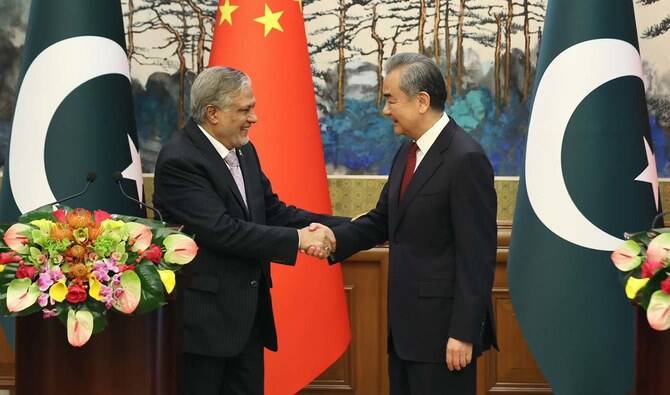ISLAMABAD: Pakistan’s deputy prime minister and foreign minister, Ishaq Dar, will be visiting China on May 19-21 to discuss “evolving regional situation in South Asia,” the Pakistani foreign office said on Sunday.
The development comes amid a ceasefire between Pakistan and India after a four-day military conflict between the nuclear-armed neighbors this month that saw the use of fighter jets, missiles, drones and artillery against the other, leaving around 70 people, including civilians, dead on both sides of the border.
In recent years, India has been seen as an important partner by Western powers as a counter-balance to China’s rising influence, while the relationship between Pakistan and Beijing has strengthened further, particularly over the last decade, with China rolling over loans and investing in multi-billion-dollar infrastructure projects in Pakistan.
During his visit, Dar will hold in-depth discussions with Foreign Minister Wang Yi on the evolving situation and its “implications for peace and stability” in South Asia, according to the Pakistani foreign ministry.
“The two sides will also review the entire spectrum of Pakistan-China bilateral relations and exchange views on regional and global developments of mutual interest,” it said in a statement.
This month’s military conflict between India and Pakistan was triggered by an attack by gunmen on tourists in Indian-administered Kashmir’s Pahalgam town, which killed 26 people on April 22. India blamed the attack on Pakistan. Islamabad denies the charge and has called for a credible, international probe into it.
Bitter rivals India and Pakistan have fought three wars, including two over the disputed region of Kashmir, since gaining independence from British rule in 1947. Both claim the Himalayan territory in its entirety but rule it in part.
Analysts and diplomats have long feared that a conflict between the arch-foes could escalate into the use of nuclear weapons, in one of the world’s most dangerous and most populated nuclear flashpoint regions.
China, which borders both Pakistan and India, this month urged the arch-foes to exercise restraint, like the rest of the major world powers.
“The visit forms part of the ongoing high-level exchanges between Pakistan and China. It also underscores the two countries’ shared commitment to further strengthen the All-Weather Strategic Cooperative Partnership,” the Pakistani foreign ministry said.












